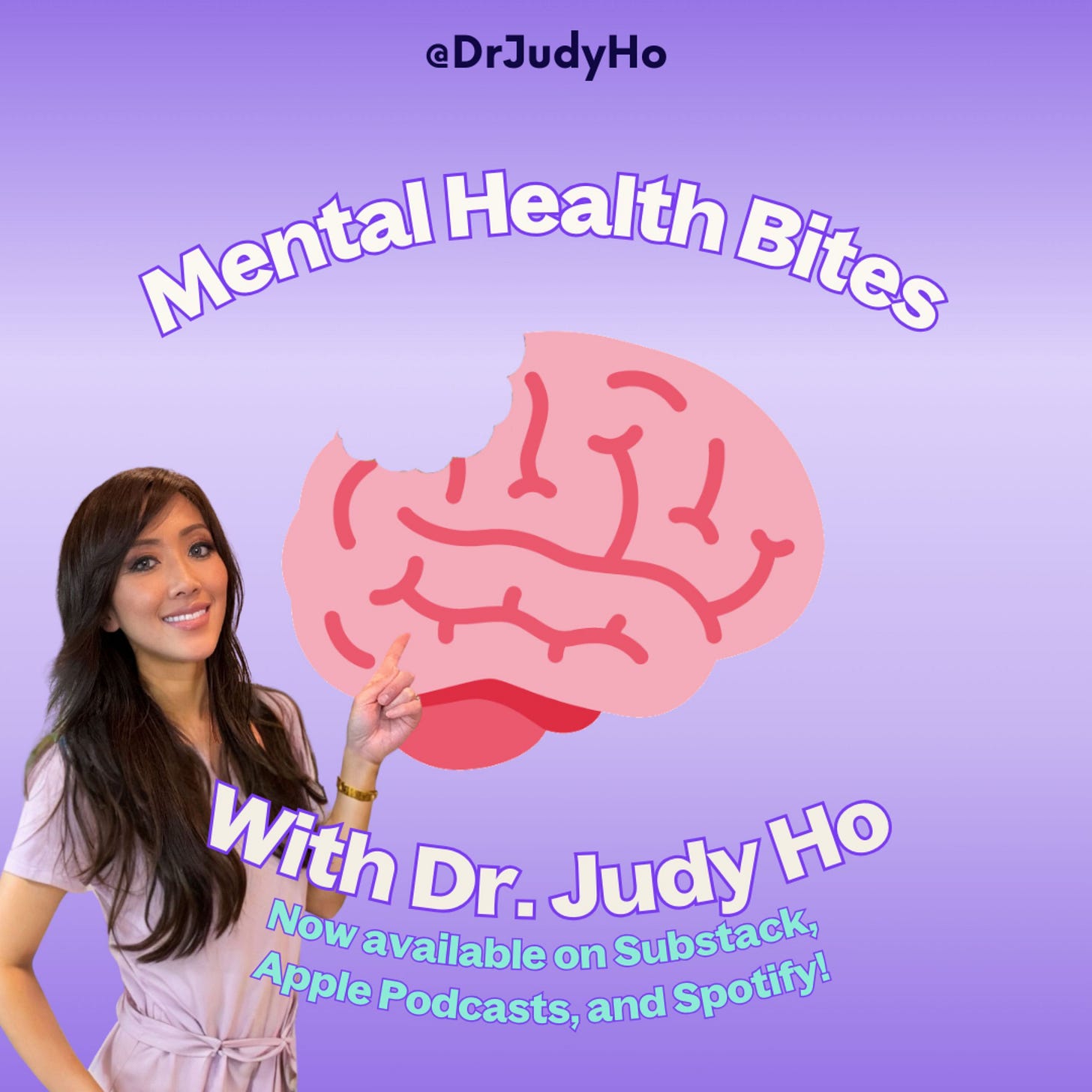Would you wake up at 5 a.m. to meditate and take an ice bath? Or, less extreme, have you sipped your way through every permutation of matcha, coffee, and hard-to-pronounce adaptogen stimulants on offer in an attempt to find the best shortcut to intense mental focus?
Productivity hacks like these are ubiquitous, filling up social media feeds as people try to find the solution to staying on task in a world often determined to distract us.
Whether you’re an entrepreneur whose efforts equal your income or a salaried employee working remotely and fighting off the siren call of YouTube videos or the annoying necessity of household chores, you’ve probably hoped for a hack that would grant you the ability to get your work done efficiently and effectively.
In the most recent podcast episode of Mental Health Bites with Dr. Judy (you can listen right here in substack, on Apple, Spotify, or watch on YouTube), I dive even deeper into productivity hacks than I do here to help you get more done—whether it’s for work or personal projects. Here, however, I want to debunk three productivity myths and share with you a technique to help you focus on what truly matters.
Three Productivity Myths
If productivity is by definition the ability to produce effectively, our first thought may be to expend more effort, time, and mental energy to try and increase output. But cutting through the morass of methods means first determining what productivity is and isn’t. Unfortunately, much of the advice geared toward increasing productivity circulating online is built on myths that keep us from our full potential. So, let’s dismantle a few of the biggest myths, and talk about what actually works.
Myth #1: "To be productive, you need to work harder and longer."
This is one of the most pervasive myths, and one that feels true. The more hours you put in, the more you’ll accomplish, yes?
But the truth is, productivity isn’t about working longer or harder—it’s about working more efficiently.
Research shows that our brains can only focus intensely for about 90 minutes at a time before we start to lose energy and make more mistakes.
What actually works is focusing on quality over quantity. Instead of working through exhaustion, try to work in focused bursts and take regular breaks. Studies show that frequent short breaks actually increase your overall output, improve creativity, and keep you energized.
Myth #2: "Busy equals productive."
Have you ever had a day where you felt like you were constantly on the go, but by the end of it, you realized you hadn’t accomplished anything meaningful? That’s because being busy doesn’t mean being productive. It’s easy to fill your day with low-value tasks that feel urgent, like checking emails or responding to messages, but that doesn’t necessarily move you closer to your bigger goals.
What actually works is prioritizing your tasks by importance, not urgency.
The most productive people focus on tasks that have a high impact, rather than those that simply fill up their time. One great method for this is using Eisenhower’s Urgent-Important Matrix, which helps you categorize tasks based on how urgent and important they are, so you can spend your time on what really matters.
Myth #3: "The more you plan, the more productive you’ll be."
Planning is definitely important, but it can easily become over-planning, where you spend more time organizing and scheduling than actually doing the work. This is a trap known as analysis paralysis, where overthinking and over-planning prevent you from taking action.
What actually works is using a flexible plan with clear, actionable steps. Give yourself room to adjust as things come up, but don’t spend too much time planning out every detail. At the end of the day, execution is what matters.

How to Focus on What Truly Matters
The Daily Highlight is a fantastic way to simplify your productivity by focusing on what truly matters. Here’s how it works:
Choose Your Highlight. At the start of each day, ask yourself, “What’s the most important thing I want to accomplish today?” It could be something work-related, like finishing a report, or something personal, like getting a workout in or spending quality time with family. The key is to pick just one thing that, if done, will make your day feel productive.
Time It. Once you’ve chosen your highlight, block off time for it in your schedule. This helps you make it a priority, and it prevents other tasks from taking over your day. Whether it’s 30 minutes or a full hour, commit to dedicating that time to your highlight.
Eliminate Distractions. When it’s time to focus on your daily highlight, create an environment where you can fully concentrate. This means turning off notifications, closing unnecessary browser tabs, and setting boundaries to make sure you don’t get interrupted.
Celebrate the Win. At the end of the day, reflect on your highlight. Did you accomplish it? If so, take a moment to celebrate that win. Even if your day didn’t go perfectly, completing your highlight can give you a sense of achievement and progress.
Focusing on one key task each day is a simple but powerful way to boost productivity without feeling overwhelmed by a huge to-do list. Over time, this habit can help you make consistent progress on your goals, whether they’re related to work, personal projects, or self-care.
If you found value in our episode today, chances are your friends will too. Just hit the share button and send it to someone who would appreciate it as much as you did.
Let me know how these tips work for you, and whether you have any productivity tips of your own I didn’t mention!
Productively yours,
Dr. Judy
Order The New Rules of Attachment here: https://bit.ly/3MvuvvF
Take my Attachment Styles Quiz!
About me:
Dr. Judy Ho, Ph. D., ABPP, ABPdN is a triple board certified and licensed Clinical and Forensic Neuropsychologist, a tenured Associate Professor at Pepperdine University, television and podcast host, and author of Stop Self-Sabotage. An avid researcher and a two-time recipient of the National Institute of Mental Health Services Research Award, Dr. Judy maintains a private practice where she specializes in comprehensive neuropsychological evaluations and expert witness work. She is often called on by the media as an expert psychologist and is also a sought after public speaker for universities, businesses, and organizations.
Dr. Judy received her bachelor's degrees in Psychology and Business Administration from UC Berkeley, and her masters and doctorate from SDSU/UCSD Joint Doctoral Program in Clinical Psychology. She completed a National Institute of Mental Health sponsored fellowship at UCLA's Semel Institute.
















Share this post